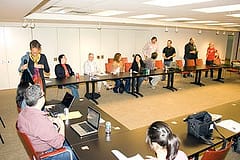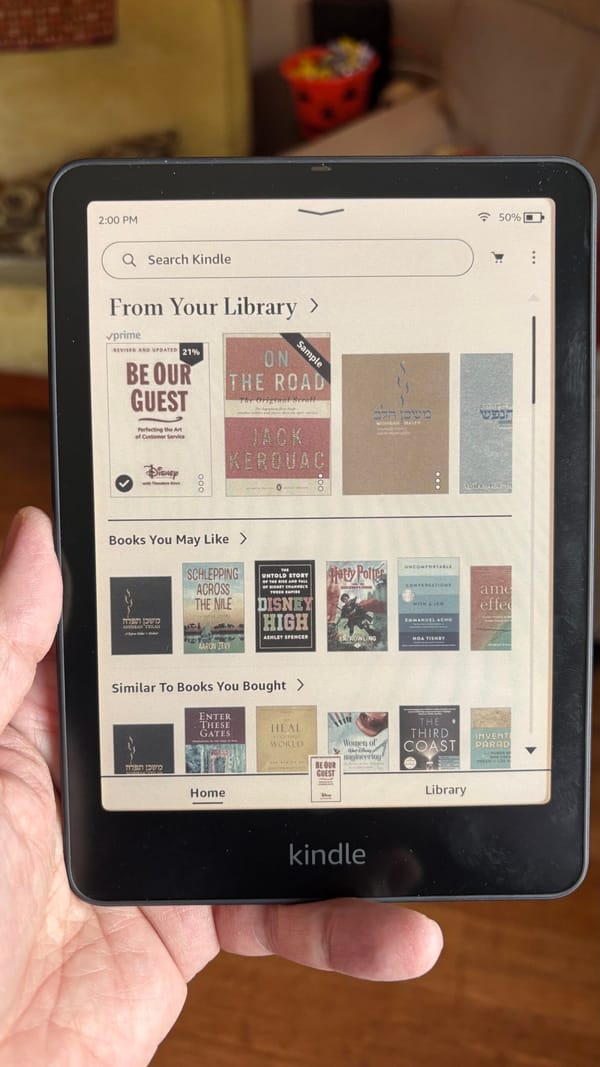Chicago Bloggers Discuss Online Sustainability at C-BOM
On the morning of Saturday, August 29th, more than two dozen Chicago bloggers sat down to talk about the future of the local blogosphere at the C-BOM: Chicago Blogging & Online Media meetup. The invitation-only event was an opportunity for Windy City scribes to continue a discussion about community

This content originally appeared on my former Chicagosphere online-media blog, hosted on the Chicago Tribune's ChicagoNow network.
On the morning of Saturday, August 29th, more than two dozen Chicago bloggers sat down to talk about the future of the local blogosphere at the C-BOM: Chicago Blogging & Online Media meetup. The invitation-only event was an opportunity for Windy City scribes to continue a discussion about community sustainability begun earlier this summer by third parties in the nonprofit and journalism communities. On Saturday, however, the bloggers finally had their say.
WANTED: A COMMUNITY VOICE FOR BLOGGERS
I originally proposed the idea for C-BOM back in June (see posts on Chicagosphere, Huffington Post Chicago, and my personal blog, Chicago Carless) after attending two major local media conferences. Community Media Workshop's Making Media Connections 2009 explored the potential to disseminate local news via niche community websites (for fullest disclosure, I moderated the Neighborhood News 2.0 panel during the event's second day.) The independent Chicago Media Future Conference asked how journalism would survive in an online-centric world.
The stated assumption at both conferences was that local blogs and websites would play a fundamental role in sharing local news online. However, discussion at both events was heavily focused on the future sustainability of journalism, with the future of the local blogosphere playing a minor role. I came away wondering how local blogs were supposed to continue to tell local news stories--or any others--without a discussion of ways to make those blogs sustainable in some way. Most importantly, after hearing numerous journalists, nonprofit advocates, and other third-parties opine on Chicago's blogging community, I wanted that discussion to take place among local bloggers, ourselves.
A DIVERSE GROUP OF PARTICIPANTS
I approached the editors of five of Chicago's top community blogs--Andrew Huff of Gapers Block, Steve Rhodes of The Beachwood Reporter, Geoff Dougherty of Chitown Daily News, Marcus Gilmer of Chicagoist, and Brad Flora of Windy Citizen--and asked them to give support in name to an idea for a bloggers-only strategy day. All agreed to do so.
Each also provided a list of invitees who in turn were asked for their own invitee suggestions. By making the event invitation-only, the idea was to help ensure a focused conversation as exclusively as possible among local Chicago bloggers. However, no one was turned away and several people requested to attend after hearing about the event through word of mouth.
In all, 61 individual invitations were sent in addition to a mass invitation to all ChicagoNow bloggers. Six people requested to attend via word of mouth. A total of 33 RSVPs were received. The event was ultimately attended by 26 people, including 10 women and an estimated 5 people of color. (For the names, websites, and URLs of those who attended, please see the bottom of this post.)
Upon learning of the C-BOM effort, Chicago Tribune digital editor and ChicagoNow blog scout Bill Adee offered to host the event at Tribune Tower and provide materials, food, and refreshments. C-BOM took place on Saturday, August 29, 2009, from 10:00AM to 1:00PM in the lower level Huron Room of Tribune Tower in downtown Chicago.
THREE KEY QUESTIONS ABOUT THE FUTURE
The event centered on three key issues: how to define sustainability; how to prepare for it on an individual, blog-level basis; and how to prepare for it as a community. What follows is a summary of the highlights of Saturday's discussion in these areas:
1. DEFINING SUSTAINABILITY
What would a sustainable local blogosphere look like? What are challenges to achieving sustainability?
The answer to this question differed for almost every person at the discussion table. A working definition of sustainability boiled down to whatever it would take to maintain a blog's status quo.
Bloggers are a diverse group. Different bloggers define sustainability in different ways. The desire and ability to make money from their blogs depends on the reasons they're writing them in the first place.
Financial sustainability is not the only important type of sustainability for bloggers. Other areas where sustainability is important include audience building and maintenance, and personal longevity (or the ability to keep writing.)
Some bloggers don't include the ability to make money from their blogs in their definition of blog sustainability at all.
Some bloggers are also journalists and/or care whether the field of journalism survives, and prefer to be paid on a reasonable scale. A potentially larger group of bloggers, in particular professional bloggers who support themselves from their websites or are paid by corporations or other third parties to write, may not care about the survival of journalism at all.
In general, the size of a given blog's audience will determine its ability to be financial sustainable.
Is it even possible to talk about sustainability on a community-wide level? Or is the Chicago's blogosphere simply the sum of its parts?
Many found the definition of community to be a tricky one. Most agreed there is a sense of community in Chicago's local blogosphere, but that overall the blogosphere here doesn't feel much more than the sum of its individual parts.
Topics, motivations, and ultimate goals are different for every blog. It's the shared points of connection that are most important. Chicago blogs can be classified into two main groups: blogs in Chicago; and blogs about Chicago.
Individual topic areas operate like "neighborhoods." Bloggers may have no formal relationships with each other in a specific topic area, but they constantly talk to and refer to each other, fostering a topical sense of community. By contrast, bloggers writing in different topic areas may never cross paths with each other without some sort of "cross-pollination" catalyst, like third-party RSS or site aggregation.
The definition of the blogosphere today is wider than it used to be when blogging first came to prominence. Just because someone doesn't use a traditional blogging platform like Wordpress or Movable Type doesn't mean they aren't a blogger.
What motivates each of us to write the blogs that we write?
Overall, most people around the table said they blogged in order to uncover and share stories that might otherwise never have a chance to be heard. However, almost every participant gave a different specific reason.
Some participants said they blogged to share their personal passions or work out inner conflicts. Others began blogging to fill news and analytical niches that they didn't think should be empty in areas such as blog news, world news, community development, social justice, public housing, politics, and feminism.
An additional group blog because they are paid to do so, or by dint of the public-outreach missions of their organizations. However it was noted that some corporate bloggers have personal reasons for blogging in their topic areas, too.
2. INDIVIDUAL SUSTAINABILITY
How are we individually preparing our blog sites for future sustainability? (Current revenue streams? Potential revenue ideas?)
Bloggers had many different answers for this question, too. Only a few in the room said blogging provided them with a significant income. Among those, some had specifically created blogs with built-in audiences they hoped would make money by filling a "community need" for information (examples: technology, sports.)
Some bloggers said they used funding drives similiar to National Public Radio, asking for audience donations, selling merchandise, and holding fundraising events. Others said they struggled with the idea of making money from their blogs because they never intended to "professionalize them" when they began writing. Some said they preferred to give content away for free and support themselves through other funding streams.
The non-profit model of financial support was also briefly touched on. [This model was explored at length at the summer's foregoing media conferences, and involves local foundations funding the creation of blogs with paid and staffs of writers--in some cases trained journalists--that concentrate exclusively on local and community news.] The model was seen as one solution but not the only solution to the challenge of blog sustainability, and it was noted foundations "still feel pressure" to fund start-up projects, not day-to-day operations.
Most in the room said they looked to or considered some form of ad sales as a primary means of monetizing their blogs. However, the worth of local ad sales was debated. A few bloggers questioned whether it would be worth it to bother to go after local ad sales on your own. It can be time-consuming to pursue small, local advertisers for small-dollar ads. Google was raised as an example of a site aggregator that is able to sell ads to advertisers of all sizes more easily because of the strength of the pooled audience numbers of member sites.
However, two bloggers with sites that currently generate significant income--Andrew Huff of Gapers Block and Andrew Reilly of The 35th Street Review--reported local ads being a fundamental part of their revenue streams. It was noted that small local ads mean more to one-person sites with low overhead, and that not all bloggers are looking to "get rich" from their blogs.
Aaron Renn of The Urbanophile presented a potential model of blog sustainability. He suggested the following elements be considered, but noted it can be difficult to graft sustainable practices onto an existing business model:
- Identify a revenue stream up front.
- Find and offer something as paid content (via a subscription model) that people can legitimately charge as a business expense.
- Use the site as a brand platform for another venture.
- Have a platform idea that can be franchised in other markets.
- Understand that advertising only works with "massive" page views.
- Keep ownership personal or private.
- Maintain low overhead.
- Keep costs fixed to generate "operational leverage": as income grows, once low fixed costs are covered, the rest is profit.
The model wouldn't necessarily work for traditional media sites. Some in the room were hoping for a discussion of sustainability models that would make from for traditional news and journalists. However, many agreed it's hard to attract revenue with investigative journalism, even for newspapers. In print, sports and opinion drives the presses, not local news, so it's not surprising for things to be similar on the Web.
Laura Washington of The Washington Report spoke in favor of Renn's subscription model, noting the great success of Rich Miller's partially subscription-based Capitol Fax state political blog and daily fax.
Alison Hantschell of First Draft noted that although there's pressure on bloggers to "pick up the slack of what's being murdered" (i.e. local news coverage), there's no responsibility to answer that call immediately, since the community is still in the "larval stages" of finding its way forward.
The Tribune's ChicagoNow is attempting to find common themes to unite different bloggers behind business ventures with the potential to make money, and to find ways to leverage more popular blogs to help improve the popularity of less lucrative sites. Chicago Now does not hold exclusive rights to content, and potential book and movie deals are not out of the question. Veronica Arreola of Viva La Feminista cautioned, "Not ever blogger gets a book or movie deal."
3. COMMUNITY SUSTAINABILITY
How could we work together to support individual and community sustainability?
The audience size needed by a given website in order to attract advertisers and make money is defined by the context of the site itself. Websites with large staffs and high overhead will need huge audiences, but more modest sites can make do with smaller audiences.
Overall, advertisers take notice of bigger audiences. Steve Dahlman of Marina City Online noted that some websites collaborate to form ad networks, pooling their audiences numbers together to attract advertisers who wouldn't be as impressed with the lower audience numbers of each individual member site. Chicago bloggers could explore creating a local ad network for this purpose.
The group debated whether an ad network with sites of differing audience demographics would be able to sell ads. Some felt it would be better for ad networks to concentrate on similarly themes blogs, noting that blogs with strong single themes have built-in audiences, and thus built-in ad bases.
Others noted that different types of advertisers look for different demographics, making it OK for divergently themed sites to belong to the same ad network. ChicagoNow was discussed as an example of a content network leveraging niche blogs with contrasting themes in order to attract advertisers, utilizing "killer" blogs (example: sports blogs) to drive traffic and revenue towards less popular sites in a format akin to a blog "newspaper".
Most of the content now found in Advertising Age concerns online media and ad sales. However, advertisers aren't yet completely comfortable with buying ads on blogs. Large and traditional advertisers often have an incomplete understanding of the blogosphere and tend to be conservative by nature and cautious about entering the social-media arena. Some traditional advertisers don't know to ask for metrics regarding online ad runs since feedback isn't possible for print ads.
To address their fears, corporations need to be shown the difference between amateur bloggers and professional bloggers. The latter group generally foster less outright controversy and take care to ensure the needs of advertisers are met.
Todd Allen of Chicago Tech News detailed three available "silos" bloggers could use to make money: charging for content; merchandising; and ad sales of various types. For ad sales to work, audience size is key. Blocks of 1 million monthly page views are easier to market. It helps if sites with at least 50,000 monthly page views band together to aggregate their audience numbers.
As the event neared completion, Steve Rhodes of The Beachwood Reporter voiced the overall question of the day, asking whether local bloggers were content to seek revenue streams on their own, or if there could be a way to help each other survive in some positive fashion.
A LOCAL BLOG AD NETWORK IN CHICAGO'S FUTURE?
In response to Rhodes' question, Andrew Huff of Gapers Block offered the existing ChicagoBloggers.com RSS aggregator site as a basis for collaboration by interested bloggers to explore the creation of an ad network or other community-based revenue ideas to help ensure the sustainability of local blogs with varying audience sizes. The surprise offer neatly capped the discussion and was received favorably by those in attendance. Details of any potential collaboration have yet to be worked out.
ACKNOWLEDGMENTS
I want to personally thank to Andrew Huff, Steve Rhodes, Geoff Dougherty, Marcus Gilmer, and Brad Flora for lending their names and online mastheads the C-BOM meetup, Bill Adee and the Chicago Tribune for their gracious material support, and Esther J. Cepeda for taking three hours of detailed notes that helped inform this event summary. Most of all, thank you to the two dozen bloggers who attended and participated in a frank and thoughtful discussion about the future of our online community.
I look forward to the collaborations and discussions that may follow from Saturday's event. As they coalesce, I will, of course, report on them here in the virtual pages of Chicagosphere.
C-BOM ATTENDEES:
Bill Adee | ChicagoNow
Todd Allen | Chicago Tech News
Veronica Arreola | Viva la Feminista
Sarah Best | @explorechicago (Twitter presence of Explore Chicago)
Esther J. Cepeda | 600 Words by Esther J. Cepeda
Megan Cottrell | One Story Up
Steven Dahlman | Marina City Online
Jasmine Davila | This Is Jasmine
Fernando Diaz | ChicagoNow
Mike Doyle | Chicago Carless | Chicagosphere
Marc Felion | Feast of Fun
Brad Flora | Windy Citizen
Alison Hantschell | First Draft
Margaret Holt | Chicago Tribune
Andrew Huff | Gapers Block
Michael Lehet | What's a Boy To Do?
"Mike Doe" The Expired Meter | Parking Ticket Geek
Sophia Madana | Breaking Tweets Chicago
Don O'Shea | Beachwood Reporter: Fantasy Fix | Swings Both Ways
Andrew Reilly | Beachwood Reporter: The White Sox Report | The 35th Street Review
Aaron Renn | The Urbanophile
Steve Rhodes | The Beachwood Reporter
Tracy S. Schmidt | ChicagoNow
Tracy Siska | Chicago Justice Project
Adrian Uribarri | Chitown Daily News
Laura Washington | The Washington Report




